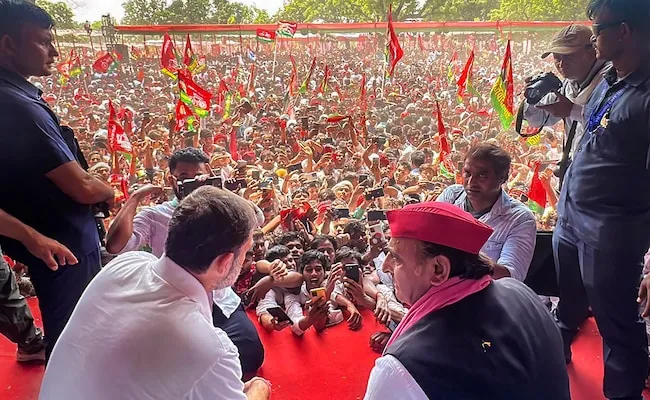
Lok Sabha Election Result 2024: “Do ladko ki jodi “give shock to BJP in Uttar Pradesh; Samajwadi Party leads in 34 seats


UP Lok Sabha Election Result 2024: Akhilesh's SP steals NDA's thunder, lifts INDIA bloc in fight against Modi
In a historic turn of events, the Samajwadi Party (SP) has made a significant comeback in the 2024 Lok Sabha elections in Uttar Pradesh, marking a pivotal moment in Indian politics.
Election Results and Key Highlights
- Samajwadi Party's Performance:
- The Samajwadi Party (SP) has emerged as a major player, leading in 34 out of 80 seats in Uttar Pradesh, signaling a resurgence under the leadership of Akhilesh Yadav.
- Akhilesh Yadav, contesting from Mainpuri, won by a margin of 1,10,654 votes. His wife, Dimple Yadav, also secured a win in Kannauj with a margin of 92,300 votes.
- This remarkable performance is part of a broader success for the INDIA bloc (Indian National Developmental Inclusive Alliance), which is leading over the National Democratic Alliance (NDA) in several states.
- From winning just five seats in the last election in partnership with the Bahujan Samaj Party (BSP), the SP has dealt a body blow to the BJP, which had won 62 seats on its own in 2019.
- Check data on : Election Commision
- Impact on BJP:

- The Bharatiya Janata Party (BJP), which previously got 62 seats on its own position in Uttar Pradesh, has faced a significant setback. Prime Minister Narendra Modi retained his seat in Varanasi but with a reduced margin of 40,449 votes compared to previous elections.
- Rajnath Singh managed to secure his seat in Lucknow, but the overall performance of BJP in the state shows a decline.
- Key Contest Results:
- Varanasi: Narendra Modi (BJP) won by 40,449 votes.
- Lucknow: Rajnath Singh (BJP) secured his seat.
- Mainpuri: Akhilesh Yadav (SP) won by 1,10,654 votes.
- Kannauj: Dimple Yadav (SP) won by 92,300 votes.
- Rae Bareli: Congress candidate Rahul Gandhi won against Kishori Lal Sharma (BJP) with a margin of 58,765 votes.
- Amethi: BJP's Arun Govil secured the seat with a close margin.
- Meerut: BJP's Arun Govil leading.
- Mathura: Hema Malini (BJP) leading.
- Kaiserganj: Karan Bhushan Singh (BJP) leading by 40,449 votes over SP's Bhagat Ram.
- Faizabad: Lallu Singh (BJP) trailing by 5,326 votes against SP's Awadhesh Prasad.
- Significant Leads:
- Chandrashekhar Azad (Azad Samaj Party) led by 1,09,799 votes over BJP's Om Kumar in Gorakhpur, indicating a major shift in voter sentiment towards regional leaders and parties focusing on local issues.
Factors Contributing to the Shift

- Campaign Strategies:
- The Samajwadi Party's campaign focused heavily on local issues, employment, and social justice, resonating with a broad spectrum of the electorate.
- Akhilesh Yadav's leadership and the party's ground-level organizational strength were pivotal in mobilizing voters.
- Voter Sentiment:
- There has been growing dissatisfaction with the BJP, particularly over issues like unemployment, agricultural distress, and economic policies. The electorate's desire for change has significantly contributed to the SP's resurgence.
- Youth and Women Voters:
- The SP managed to attract a significant number of young and women voters, who were disillusioned with the current government's performance. Promises of better job opportunities and social welfare schemes were central to their appeal.
Future Implications
- Policy Changes:
- The success of the SP and the INDIA bloc could lead to a shift in policy focus towards more inclusive and regional-centric development programs.
- Issues such as unemployment, education, and healthcare are likely to receive greater attention in the legislative agenda.
- Political Landscape:
- This election marks a significant realignment in Indian politics, with regional parties gaining prominence and challenging the dominance of national parties like the BJP.
- The results may encourage similar coalitions in other states, potentially reshaping the political dynamics across India.
- Governance and Administration:
- With increased representation in the Lok Sabha, the SP and its allies will have greater influence in legislative decisions, potentially leading to more robust debates and diverse perspectives in governance.
Summary in Points
- Samajwadi Party leads in 34 seats in Uttar Pradesh, marking a major comeback.
- BJP faces significant losses, indicating voter dissatisfaction.
- Key victories include Akhilesh Yadav in Mainpuri (1,10,654 votes) and Dimple Yadav in Kannauj (92,300 votes).
- INDIA bloc's effective alliance strategies contribute to their lead over NDA.
- Key issues: Employment, social justice, and economic policies drive voter sentiment.
- Future implications include potential policy shifts and a redefined political landscape.
Akhilesh Yadav’s leadership has proven pivotal, especially following the death of SP patriarch Mulayam Singh Yadav. The election campaign, often dismissed by Modi as "do ladko ki jodi" (two boys' duo) referring to Yadav and Rahul Gandhi, has effectively countered BJP's narratives and significantly altered the political dynamics in Uttar Pradesh.
The resurgence of the Samajwadi Party in Uttar Pradesh signifies a crucial turning point, highlighting the evolving dynamics of Indian democracy and the growing influence of regional political forces. This election underscores the importance of addressing local issues and the electorate's demand for more inclusive and responsive governance.
We have a dedicated team of three passionate individuals working tirelessly to bring you the news you need. Our team is led by Kaushalendra, the visionary owner and founder of Newshaq, who is committed to simplifying news delivery. Alongside Kaushalendra, we have two other team members who are equally dedicated to our mission of making news accessible and understandable for all.























Post Comment